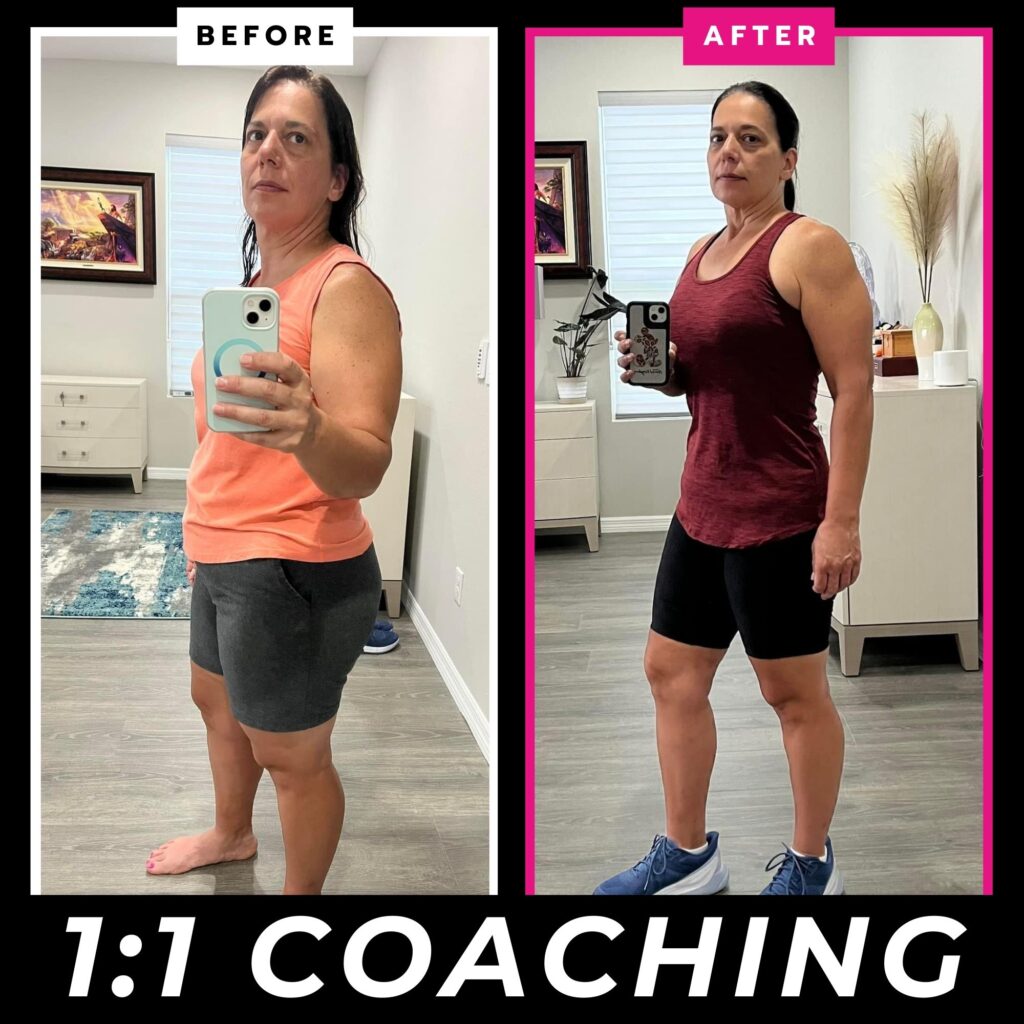
The Diet And Fitness Industry LIED To You (4 TRUTHS)
The diet and fitness industry has lied to you.
I’m not talking about the false magic pills and quick fixes when I’m saying you’ve been lied to when it comes to your diet and workouts.
Actually I see the problem as something else…
The disconnect between many trainers, coaches, dietitians and professionals and the people they want to help.
What keeps us stuck in this yo-yo dieting cycle is oddly the gap between what we “should” ideally be doing and what is realistic for our lifestyle.
Because food is not just truly fuel any longer.
It’s social. It’s celebration. It’s emotional. It’s enjoyment.
Yet instead of recognizing this and striking a balance, weighing the cost and rewards of everything for ourselves, we seek to be perfect and hit some arbitrary standards of clean eating only to create unsustainable habits which ultimately backfire.
These unsustainable habits keep us stuck losing the weight only to regain it and more as we fall back into old lifestyle patterns and try to do things we enjoy.
We never learn to create the healthiest version of our personal lifestyle.
That’s why I want to go over 4 common diet and exercise MYTHS I see pushed far too often in the health and wellness realm.
One size doesn’t fit all and we need to accept the opportunity in options to find our balance.
How we build our 80/20 balance will be unique!

Myth #1: X food is evil.
Pick a food and you can probably find a video, blog, article…even study…about how it is bad for you.
According to a commenter on one of my videos even water is bad for you.
And honestly, almost every food DOES have a downside to even the upsides it may provide.
That doesn’t make a food evil. It doesn’t even mean the food may not be part of our lifestyle balance.
But we just have to go in knowing how it will impact our health and overall wellbeing.
And sometimes the risk is worth the reward.
Sometimes something “unhealthy” we may choose to include because we ENJOY it.
It helps us relax. Enjoy social gatherings.
Or even just serves as that treat on a stressful day while keeping us overall on track working toward our goals.
Because stress overall can have detrimental effects, it’s sometimes more important we include something that doesn’t add to our stress or even takes away from it over restricting a food because it isn’t as nutrient dense or beneficial as something else may be.
We have to remember that all stress goes in one bucket.
While we may see stressors in our lives as in separate categories…
Stress at work, stress to change habits, stress at home or stress on our body from lack of sleep….all impact our mind and body compounding together.
So sometimes finding little ways to not add to our stress to overwhelm ourselves is key so we can actually make healthy changes to our lifestyle overall.
Sometimes it is that we need to pick the lesser of two evils to meet ourselves where we are at to make changes.
So stop demonizing things and trying to force someone else’s standards of “healthy” and balance on yourself.
Because one size doesn’t fit all.
Even healthy foods can be unhealthy or not right for certain people.
For example, cruciferous vegetables (like broccoli, Brussels sprouts, kale, cabbage..) have been linked with many health benefits, such as a reduced risk of cancer and heart disease.
BUT…
These same nutritious vegetables we all believe to be AMAZING contain compounds called thiocyanates which can interfere with the body’s ability to absorb iodine.
This may contribute to hypothyroidism and is why many with thyroid issues may be told not to eat too many of these supposedly super “healthy” food.
Same thing can be said for those with dairy intolerance, gluten intolerances, and issues with FODMAPs.
Foods that may be healthy or right for one person may not work for someone else to address their health concerns.
But we don’t need to demonize something just because it isn’t right for someone else!
That may hold us back even from getting the nutrients or fuel WE need!
Stop seeing foods as just good or bad. Weigh the costs involved to find your balance!
Myth #2: Weight loss is just about calories in vs. calories out.
Yes. You need a calorie deficit to lose weight. I’m not saying calories don’t matter.
But this oversimplification is truly what so often keeps people stuck on this dieting roller coaster.
They cut calories. Lose the weight. Can’t stay in a deficit forever…
So they go back to eating more and their old lifestyle habits only to regain the weight and even more.
Before they again cut calories to try to lose.
However, it gets harder and harder each and every time due to this sole focus on calories in vs. calories out.
Why does it get harder?
Because often when we only focus on cutting calories, we slash them as low as possible to lose weight as fast as possible.
And in the process we throw our hormones out of whack, create cravings that lead to us overeating, leading to even extra weight gain and we’ve often also created metabolic adaptations in the process which means our body even runs more efficiently off of fewer calories than it did before.
This is often due to us slashing our calories super low, or trying to train longer and harder to create the deficit because we’re only focused on calories in vs calories out. This extreme deficit to lose faster on the scale results in more muscle being lost over us controlling as much as possible to lose fat while maintaining our muscle.
So as much as yes, the simple answer is create a calorie deficit and you’ll lose, this oversimplification keeps us stuck and is why we often struggle more and more to lose weight as we get older, and especially once the hormonal changes of perimenopause hit.
If we want to set ourselves up for success, we need to embrace the learning process and focus on the macronutrients in our foods – the portions of proteins, carbs and fats that we are consuming.
Because through adjusting these portions, we can help ourselves feel more fueled, retain lean muscle to keep our metabolic rate higher and we can help ourselves be prepared to transition to MAINTAINING our new results.
You can’t do one thing to lose the weight then go back to what you were doing. And you can’t stay in a deficit forever.
Through a focus on tracking macros, you can help yourself retrain your body to return to a new maintenance level calorie intake so that all of your hard work to lose doesn’t go to waste!
Myth #3: HIIT is the best form of training for fat loss.
HIIT or high intensity interval training is an efficient and intense form of training. It is definitely a great option when we are short on time.
And as the term is used these days, it can refer to a variety of different interval breakdowns and include a diversity of exercises.
BUT as much as I even love HIIT personally and do use it with clients, I think it is key we recognize that there are downsides to every technique or tool.
The more we recognize both the good and the bad instead of just seeing things as either or, the more we can adjust our training and fueling to match our needs and goals as they even evolve over time.
Too often we also “fall in love” with a technique then start to see our results slow or issues pop up, yet we eliminate some other change we’ve made assuming causation when there was none.
We can throw out something we should keep doing instead of adjusting something we’ve always done prior just because we like it or it FEELS like it is working.
And HIIT is often one of those things.
While definitely an option to consider when you’re short on time, too often we do MORE HIIT style training while also trying to increase our calorie deficit to lose fat.
As a result, we not only can see our energy levels tank so we aren’t able to push as hard and get as much out of our training, but we can also start to see more muscle mass being lost and cravings increase.
By trying to do more intense training sessions while in a calorie deficit already, we can make it harder on ourselves to maintain the nutritional changes we are trying to make.
So we always need to consider the systems and how they are working together.
We may need to change up a HIIT cardio session for a slower strength workout with longer rest periods.
We may need to adjust the intervals of work to rest in the interval workout we are doing.
Or even knowing how depleting HIIT can be and the fact that for some it can make them FEEL even hungrier while increasing cravings for carbs, you can plan for those downsides in your fueling.
HIIT isn’t something you have to do to lose fat. It isn’t also something you shouldn’t do. The point is learning more about the techniques and workout designs we include so we can plan all of our systems to work together.
While it can feel satisfying to have sweated and worked hard in our workouts, we also want that hard work to be moving us forward instead of being wasted effort!
Myth #4: Workouts are about burning more calories.
There isn’t anything wrong with tracking your calorie burn from your activity to watch your trends and hold yourself accountable.
But too often we just seek to get that number higher over truly training with purpose and intention.
This often leads to us turning even our strength workouts into more cardio sessions.
Less rest, feeling more out of breath often leads to a higher heart rate on our trackers, which then results in more calories being burned.
And always focusing on doing more and making our training more intense can cause some to suffer increased cravings and a harder time sticking with the dietary changes they need.
Not to mention, it can work against any muscle gaining efforts we may have.
It can also lead to us unknowingly eating in a surplus over a deficit.
It’s key we realize that these trackers are NOT ACCURATE! The calorie burn is going to be off especially as we adapt to our training.
And while it may not seem like a big deal to only be 50-100 calories off in some cases, that can really lead to us eating over our deficit especially if we are trying to create a smaller one to help achieve better fat loss results!
Not to mention we make it harder to truly track what is and isn’t working if our intake is fluctuating all over based on what our trackers says day to day.
STOP seeing the purpose of your workouts as just a way to burn more calories.
Remember, you can’t out exercise your diet.
Trying to create more of a calorie deficit through your training will lead you to either overtraining or ultimately overeating.
You will either keep having to do more as you adapt to burn the same amount calories you once did.
Or if you let your watch dictate how many calories you get, you’ll start overeating because often our watches won’t fully recognize we’ve become more efficient at the training routines.
And our workouts should be about building lean muscle while training our body to move well.
We want our workouts to help us stay strong for LIFE so we can remain independent and capable.
Not to mention, a focus on strength work helps us build that muscle mass which helps us burn more calories at rest since our metabolic rate and energy demands will be higher.
So while you want to do forms of training you enjoy to stay consistent and active, you also want your workouts to have long-term benefits so you can tackle any challenge you want in every day life!
Too often we view things as solely good or bad instead of looking at the cost and benefit of each thing we include.
When we don’t view the opportunity in each option, we don’t allow ourselves to truly create something sustainable.
And this, while good for the diet and fitness industry, is not helpful for us to see the results we want.
Seek to learn about what you need and be open to new perspectives so you can adjust your fueling and training to match your needs and goals even as they evolve over time!
Ready to dial in your workouts and your diet to acheive the best results as fast as possible?
Schedule a coaching consultation to learn more about how we can help you create the systems you need to succeed!



